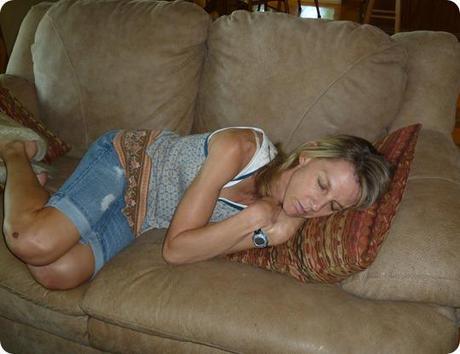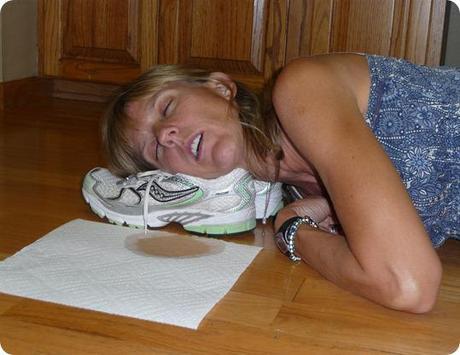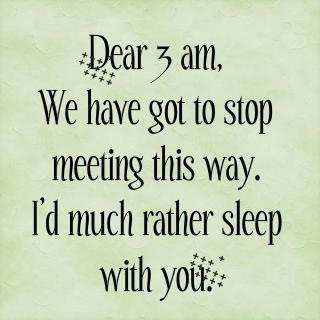I love my bed. Most days I gaze longingly at it and can’t wait until an acceptable time to crawl between the sheets and snooze for 8 or 9 hours (apparently 5 p.m. is not acceptable). Once I’m in, I start nodding off about the time the weather guy starts lying about tomorrow’s forecast. Groggily, I switch off the light.
What happens next confuses me, and seems to be getting worse as I get older. I fall asleep quickly, but often wake in the night and am awake for long periods of time. Or – I wake very early, say 3 o’clock a.m., and never make it back to sleep before my 5 o’clock a.m. wake up call. The result of all of this?
DSD – Damn Sleep Deprivation.

Usually if I have a race the next morning, or a very long/difficult work out planned, it is more likely that I will get less sleep. This must be anxiety related. Yet, some of my best training work outs and races have been after very poor nights of sleeping. How can this be? I’ve also often wondered how sleep, or lack thereof, affects performance. I looked and found some answers.
How Damn Sleep Deprivation (DSD) Affects Running
- When you run, you break down your body. You actually get microscopic tears in your muscles. Rest and recovery gives your body the chance to heal these tears and to build even stronger muscles. If you are sleep deprived, this process happens less, or not at all. This can increase chance of injury and just make you feel like crap.
- DSD can decrease your body’s ability to fight colds, flus and other illnesses. In other words, lack of sleep compromises the immune system.
- Athletes who had DSD report reaching a point of exhaustion 11% more quickly than those who were well rested. DSD makes workouts feel harder than they would if you had adequate sleep. Not rocket science.
- Less sleep can inhibit your body’s ability to sweat. This can keep you from cooling down adequately in hot weather.
The Good News
- If you don’t sleep the night before a race, the adrenaline of the event usually overrides the negatives of sleep deprivation. So calm down. You’ll be fine.
- While some researchers say that 7 hours of sleep is the magical number, other studies show it is more important that sleep amounts and routines are consistent, than how much a person actually sleeps.
- Sleep aids like Tylenol PM and even Ambien have not been shown to decrease performance. I wish chardonnay was on that list.
How Do You Know If You Have DSD?
- Everything makes you cry – even the Olympic theme song.
- You nod off throughout the day. I thought everyone did this, but maybe that is because everyone has DSD.
- You fall asleep within five minutes of laying your head on the pillow. This often leads to men feeling a different kind of DSD – Damn Sex Deprived. But, that’s another blog post.
- You get overwhelmed easily: “I don’t KNOW what I want on my f*cking Subway sandwich! Too many choices! Who invented this place anyway?”
- You fall off the curb, spill things, and fall up the stairs. Your coordination is in the toilet!
- You drool on your lunch and eat it anyway.

What Do You Do About DSD?
- Be a creature of habit. Go to bed at the same time every night. Your body thrives on and responds well to routine.
- Abstain. Don’t drink alcohol or caffeine within six hours of bedtime. I break this rule every single night.
- Get it done early. Don’t exercise within three hours of bedtime. Not a problem. I am too busy catching up with the Real Housewives.
- Sleep in a dark, cool place. I prefer a cave in the side of a mountain.
- Don’t arouse yourself. Don’t do anything too stimulating right before bed. Although I think sex is okay.
- Get a good mattress.
- Try meditating, or find a way to quiet your mind.

How Much Do the Pros Get?
According to Strength Planet in their article, “15 Surprising Things About World Class Athletes”, pros sleep an average of 520 minutes per night - 8.75 hours a night. That is approximately an hour more sleep than what researchers found for the average person. According to those researchers, the average person sleeps 7.5 hours per night.
Bottom Line
Research shows most of us don’t get enough sleep (Americans are some of the most sleep deprived people on the planet), and it affects our performance. But, since I’m not a pro athlete and don’t see that in my future, I’m not going to get all stressed out about it. I do the best I can, but I also realize I have a life and a lot of stuff that swirls around in my head. Some nights will simply be better than others. I was thrilled to read on Running Research News that, “if you miss several hours of sleep for a night or two before your race, your performance is not likely to be impacted.” I can live with that.
How much sleep do you get per night? Do you have trouble falling or staying asleep? This is getting worse for me. I now only get 5-6 hours per night.
Have you been able to link how you feel while running or your rate of recovery to your sleep habits? Sometimes, but usually only if I am lacking in many hours of sleep over several nights.
What’s your best tip for getting a good night’s sleep? Sleeping really badly the night before.
SUAR
Sources for this post:
That’s Fit: Advice for Sleep Deprived Runners
Running Times: A Good Night’s Rest
Suite 101: Lack of Sleep Can Sabotage Running Training
Running Research News: How Running Affects Sleep and Vice Versa

